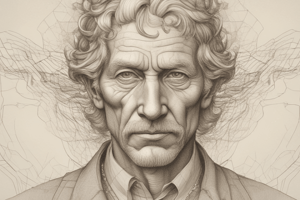Podcast
Questions and Answers
What is the main challenge of Stage 1: Trust vs. Mistrust?
What is the main challenge of Stage 1: Trust vs. Mistrust?
- Developing basic trust (correct)
- Learning to control will
- Forming intimate connections
- Developing a sense of industry
What age range does Stage 2: Autonomy vs. Shame and Doubt cover?
What age range does Stage 2: Autonomy vs. Shame and Doubt cover?
1-2 years
In Stage 3: Initiative vs. Guilt, what do preschoolers learn?
In Stage 3: Initiative vs. Guilt, what do preschoolers learn?
To initiate tasks and carry them out
What is developed in Stage 4: Industry vs. Inferiority?
What is developed in Stage 4: Industry vs. Inferiority?
What age range corresponds to Stage 5: Identity vs. Role Confusion?
What age range corresponds to Stage 5: Identity vs. Role Confusion?
In Stage 6: Intimacy vs. Isolation, young adults must form connections with others.
In Stage 6: Intimacy vs. Isolation, young adults must form connections with others.
What developmental concern is associated with Stage 7: Generativity vs. Stagnation?
What developmental concern is associated with Stage 7: Generativity vs. Stagnation?
What do older adults engage in during Stage 8: Ego Integrity vs. Despair?
What do older adults engage in during Stage 8: Ego Integrity vs. Despair?
Flashcards are hidden until you start studying
Study Notes
Stage 1: Trust vs. Mistrust
- Occurs from birth to 1 year of age.
- Infants develop basic trust when their dependency needs are consistently met by caregivers.
Stage 2: Autonomy vs. Shame and Doubt
- Takes place between 1 and 2 years old.
- Toddlers learn to exercise will and make choices independently, fostering a sense of autonomy.
Stage 3: Initiative vs. Guilt
- This stage spans ages 3 to 5 years.
- Preschoolers engage in initiating tasks and pursuing independent actions; failure to do so can lead to feelings of guilt.
Stage 4: Industry vs. Inferiority
- Occurs during the ages of 6 to 12 years (elementary school age).
- Children develop a sense of competence through skills and productivity valued by their culture; lack thereof can result in feelings of inferiority.
Stage 5: Identity vs. Role Confusion
- Encompasses ages 12 to 20 years, during adolescence.
- Young individuals work on forming a coherent sense of self and understanding their place in society; confusion in these aspects leads to identity issues.
Stage 6: Intimacy vs. Isolation
- Engages young adults aged 20 to 30 years.
- This stage focuses on forming intimate relationships with others; failure to connect can lead to feelings of isolation.
Stage 7: Generativity vs. Stagnation
- Applies to middle-aged individuals between 30 and 65 years old.
- This stage emphasizes an interest in guiding and influencing the next generation; stagnation occurs when one fails to contribute meaningfully to society.
Stage 8: Ego Integrity vs. Despair
- Applies to individuals aged 65 and older.
- Older adults reflect on their lives, assessing fulfillment; a lack of satisfaction can lead to feelings of despair.
Studying That Suits You
Use AI to generate personalized quizzes and flashcards to suit your learning preferences.




